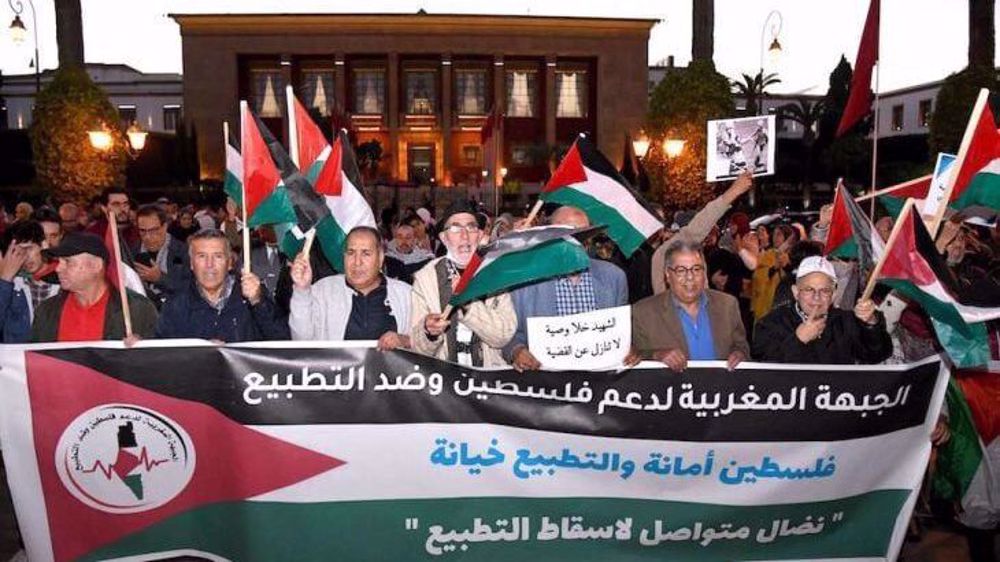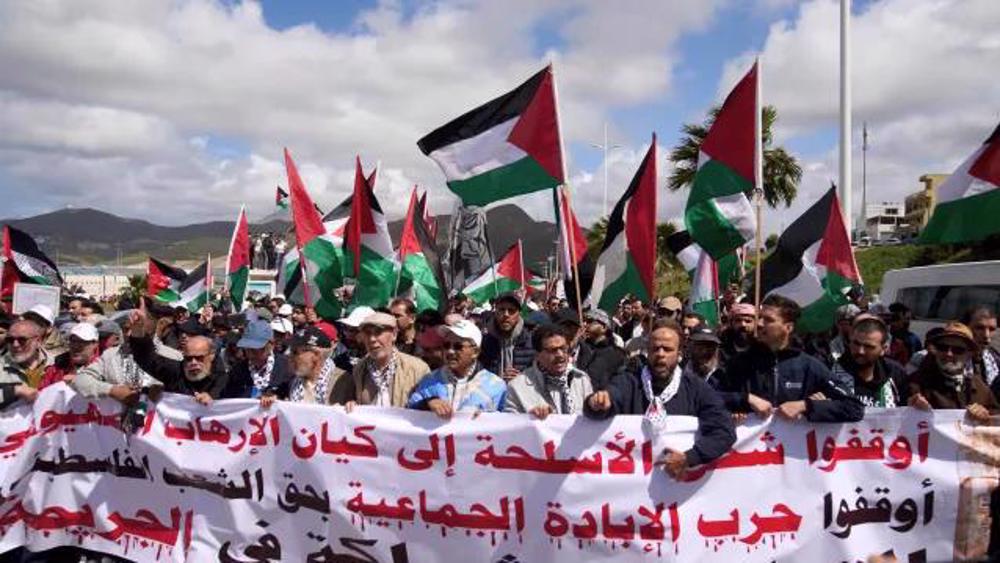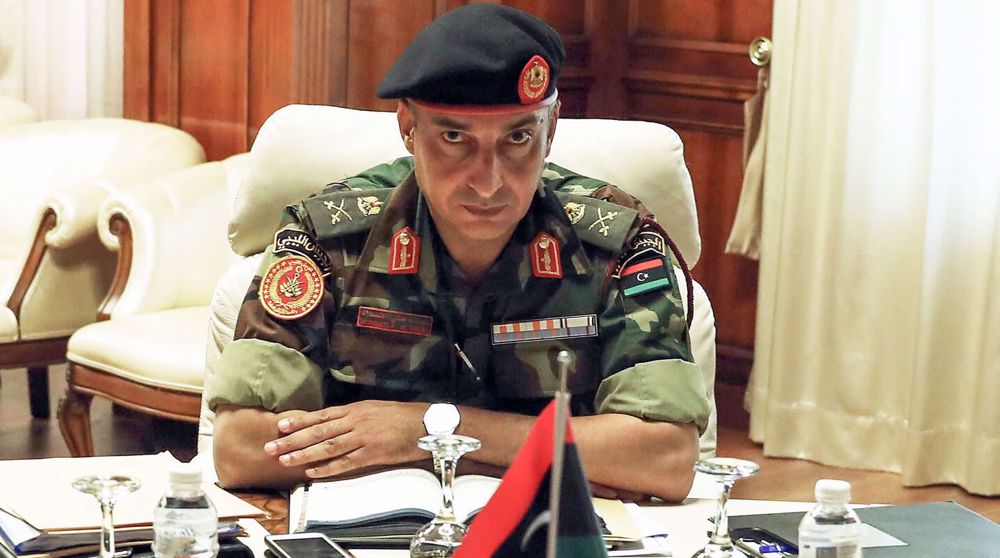Russia ‘not backing Haftar’s Tripoli offensive’
Russia says it has not assisted forces loyal to Libyan strongman Khalifa Haftar in their latest push to take over Tripoli, calling for a political solution to the recent flare-up of tensions in Libya.
Asked if Russia was backing Haftar’s new offensive on the Libyan capital, Kremlin spokesman Dmitry Peskov told reporters on Friday that Russia was not involved.
Haftar on Thursday announced that his forces would begin an offensive against Tripoli, which is currently controlled by the county’s internationally-recognized government. The so-called Libyan National Army (LNA), under Haftar’s command, claimed that its advance on the country’s west was meant to root out what it called “terrorist groups” in the restive region.
Peskov said Moscow was monitoring the developments.
“We are closely following the situation in Libya,” the Kremlin spokesman said. “Of course we consider that the most important thing is that (military) operations there do not lead to bloodshed. The situation should be resolved peacefully.”
UN chief meets Haftar in Benghazi
Amid the escalation, United Nations (UN) Secretary-General Antonio Guterres met Haftar in the eastern city of Benghazi on Friday, witnesses said.
Guterres, who had been in the Libyan capital this week to help organize a national reconciliation conference slated for later this month, reportedly also met Aguila Saleh, the speaker of the eastern-based parliament, in the city of Tobruk earlier on Friday.
The UN chief left Libya after the meetings, with “a heavy heart and deeply concerned,” he said on Twitter, adding, “I still hope it is possible to avoid a bloody confrontation in and around Tripoli.”
I leave Libya with a heavy heart and deeply concerned. I still hope it is possible to avoid a bloody confrontation in and around Tripoli.
— António Guterres (@antonioguterres) April 5, 2019
The UN is committed to facilitating a political solution and, whatever happens, the UN is committed to supporting the Libyan people.
Haftar’s forces, however, continued their advance on the capital on Friday, capturing the village of Suq al-Khamis, some 40 kilometers south of Tripoli, a resident and an eastern military source said. The capture came after clashes with forces allied to the UN-backed Tripoli government, the sources said.
Eastern Libyan forces later seized the former Tripoli International Airport on the southern outskirts of the capital, a spokesman said.
Ahmed Mismari also told reporters his forces were in control of Tarhouna and Aziziya, two towns near Tripoli. He said five of his troops had been killed.
On Thursday, LNA forces seized Gharyan, about 80 kilometers south of Tripoli after skirmishes with forces allied to the Tripoli-based government. But they were driven from a checkpoint less than 30 kilometers from Tripoli early on Friday.
Tripoli’s forces captured 145 LNA fighters in Zawiya, west of Tripoli, a western commander, Mohamed Alhudair, told Reuters on Friday, adding that 60 of their vehicles had also been confiscated.
An LNA source said 128 forces had been captured.
UN Security Council, G7 call on Haftar to halt Tripoli advance
In another development, the UN Security Council on Friday called on Libyan forces under Haftar to halt their advance on Tripoli, warning the military move was putting Libya's stability at risk.
The council "called on LNA forces to halt all military movements," German Ambassador Christoph Heusgen, who holds the council presidency, told reporters following a closed-door meeting.
In addition, foreign ministers from the G7 group of industrialized nations issued a similar warning against an advance towards the capital.
The top diplomats from Britain, Canada, Germany, Italy, France, Japan and the United States issued a statement amid an annual meeting in western France, saying the Libyan conflict has “no military solution.”
"We strongly oppose any military action in Libya. Any Libyan actor or faction that precipitates further civil conflict are harming innocent people and standing in the way of the peace that Libyans deserve," the statement said.
Libya has been the scene of increasing violence since 2011, when former dictator Muammar Gaddafi was toppled from power after an uprising and a NATO military intervention. His ouster created a huge power vacuum, leading to chaos and the emergence of numerous militant outfits, including the Takfiri Daesh terrorist group.
The oil-rich country is now divided between two rival governments — the House of Representatives, based in the eastern city of Tobruk, and the internationally-recognized government of Fayez al-Sarraj, or the Tripoli-based Government of National Accord (GNA).
Haftar and the LNA have been backed by certain Arab governments, including the United Arab Emirates and Libya’s neighbor Egypt, and governments in Europe that once contributed to the NATO military operation to oust Gaddafi have also offered Haftar some diplomatic support.
US envoys blocked warning of Gaza turning into ‘apocalyptic wasteland’: Report
VIDEO | Press TV's news headlines
VIDEO | Pakistan rejects link between Gaza 'Peace Board,' Abraham Accords amid outcry
VIDEO | Displaced families struggle to survive after Heglig attacks in Sudan
Iran’s top security official, Russian president discuss economic cooperation, regional issues
Leader’s advisor warns of ‘deep’ retaliatory strikes into occupied territories
Explosive new Epstein files reveal Trump raped 13-year-old girl, murdered newborn
VIDEO | EU blacklists anti-terror organization












 This makes it easy to access the Press TV website
This makes it easy to access the Press TV website